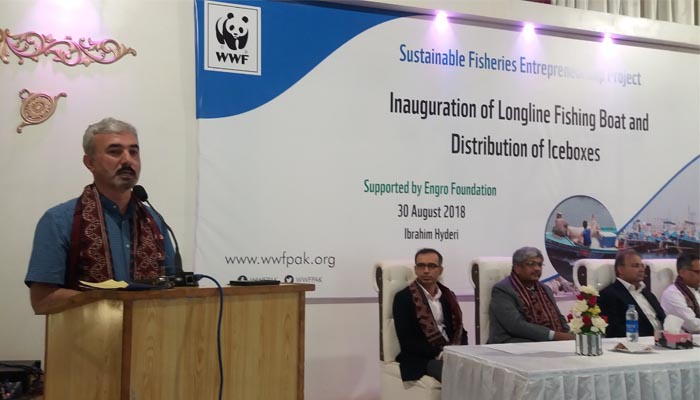Community engagement urged for the protection of marine resources
Fisheries resources have been severely affected in the past few decades, mainly due to overfishing, unsustainable fishing practices and marine pollution.
Karachi: Fisheries resources have been severely affected in the past few decades, mainly due to overfishing, unsustainable fishing practices and marine pollution.
Trainings and capacity building programmes for fishers can help address declining fish stocks and promote income generation opportunities for local communities.
This was stated by speakers during the inauguration of fishing boat converted to longline and distribution of iceboxes ceremony organized by WWF-Pakistan under the project titled ‘Sustainable Fisheries Entrepreneurship: A Citizen Based Approach to Saving Pakistan’s Unique Marine Environment’ at Ibrahim Hyderi.
The project initiated in three coastal union councils of Karachi including Ibrahim Hyderi, Rehri Goth and Maripur is supported by Engro Foundation. Initiated in July 2016, the project has supported fishing communities in improving capacities and providing alternative livelihood opportunities to the local fishermen.
It has helped reduce post-harvest losses and by-catch of endangered and threatened species as well as promoted sustainable fishing practices.
Hammad Naqi Khan, Director General WWF-Pakistan said that subject to a host of problems, coastal communities in Pakistan are confronted with reduced incomes and livelihood opportunities.
He further said that illegal fishing practices coupled with increasing marine pollution are not only threatening fish stocks but other endangered marine life which is also vanishing from oceans.
He informed that capacity building programmes and awareness sessions initiated among local fishers have resulted in the rescue and safe release of a number of endangered and unique marine species and include dolphins, sunfishes, whale sharks and other important marine life.
He emphasized on the need to educate the youth of coastal communities who can play a pivotal role in conservation of marine resources. Khan stressed that pollution is the major cause of degradation of marine resources and called for innovative solutions to address this issue.
While, speaking on the occasion, Jahangir Piracha, CEO Engro Vopak shared that sustainability of fisheries resources is at the heart of Engro and that the organization is focusing on investing in projects which provide better living standards to the local communities involved in fishing.
He also shared that Engro has been part of various environmental initiatives and has helped revive 5,000 hectares of mangroves in Port Qasim and surrounding areas. He was of the view that mangroves are not only a good source of sustenance for people but provide nursery grounds for different fish species.
He appreciated the efforts of fishermen who are engaged in rescue and release of endangered marine species. He also expressed commitment to continue supporting these communities through various skill development and education programmes across Sindh.
During the event it was also discussed that increasing levels of pollution, both solid waste and wastewater in marine waters, is one of the major challenges communities face today.
Solid waste, such as organic waste from cattle colony (cow dung), piles of plastic waste from the whole city through drains, untreated wastewater and its nuisance smell from Korangi Industrial Area and Port Qasim, have significantly polluted creek waters.
Due to this fish resources are being depleted, which is directly impacting the economic conditions of communities highly dependent on fisheries.
On this occasion, Saeed Zaman, a WWF-Pakistan trained fisherman was presented the Best Observer Award for his contribution towards the protection of marine species. So far he has rescued 12 whale sharks and more than 400 turtles in Pakistani waters.
Muhamamd Moazzam Khan, Technical Advisor, WWF-Pakistan; Favad Soormo, Director, Engro Foundation and Dr. Babar Khan, Director Wildlife, WWF-Pakistan also spoke on the occasion.
-
Security forces gun down 30 terrorists in multiple IBOs in KP: ISPR
-
MQM-P calls for new province in Sindh
-
US report validates Pakistan military edge over India: PM
-
Banned TTP poses serious threat to Pakistan security: UNSC panel
-
CM Afridi clarifies remarks on by-poll after ECP requests army deployment
-
Dubai sees 3.2m Pakistani passengers in 2025 as airport sets new milestone
-
Security forces kill 23 Indian proxy terrorists in KP's Kurram
-
Pakistan to construct island to boost oil exploration: report












